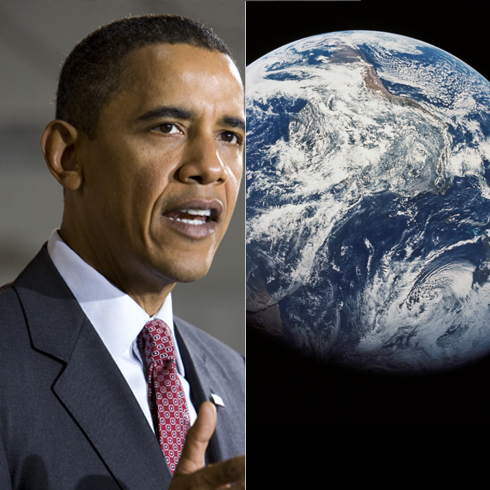President Obama was all set to go to Copenhagen for the global climate change talks next week, but the White House has announced a change of plans.
Environmental experts and other nations questioned the effectiveness of the president’s decision to attend the conference at the beginning instead of at the end when other world leaders were gathered there.
One reason for the shift is that Obama intended to get things kicked off. Before the conference has even started China and India announced major carbon reduction plans for the first time ever, and Europe and Australia have settled on a $10 billion per year to help developing countries meet whatever is established as the new framework.
The White House says Obama always wanted to attend the talks when his presence would be most meaningful, and given the early positive signs, it made sense for him to delay the trip.
White House Press Secretary Robert Gibbs just released a statement saying that Obama will do just that.
“Based on his conversations with other leaders and the progress that has already been made to give momentum to negotiations, the President believes that continued US leadership can be most productive through his participation at the end of the Copenhagen conference on December 18th rather than on December 9th,” Gibbs said.
As we have reported, it took the White House weeks to decide if he would attend, even though Obama was already planning to be in the region when he accepts the Nobel Peace Prize in Oslo.
Last week they made the announcement official that he would go, and made plans for the press to tag along. Still, the criticism was abound given the timing.
The president’s Green Cabinet and aides tasked with climate will still attend the rest of the conference.
Gibbs’ full statement:
The President strongly believes that all nations have a responsibility to combat the threat of climate change. He has already taken unprecedented action to do so at home, including an historic investment in clean energy solutions that will reduce our dependence on oil and create jobs. Abroad, he has engaged leaders bilaterally and multilaterally on the issue of climate change, and agreed to participate in the climate conference in Copenhagen.
After months of diplomatic activity, there is progress being made towards a meaningful Copenhagen accord in which all countries pledge to take action against the global threat of climate change. Following bilateral meetings with the President and since the United States announced an emissions reduction target that reflects the progress being made in Congress towards comprehensive energy legislation, China and India have for the first time set targets to reduce their carbon intensity. There has also been progress in advancing the Danish proposal for an immediate, operational accord that covers all of the issues under negotiation, including the endorsement of key elements of this approach by the 53 countries represented at the Commonwealth Summit last weekend.
This week, the President discussed the status of the negotiations with Prime Minister Rudd, Chancellor Merkel, President Sarkozy, and Prime Minister Brown and concluded that there appears to be an emerging consensus that a core element of the Copenhagen accord should be to mobilize $10 billion a year by 2012 to support adaptation and mitigation in developing countries, particularly the most vulnerable and least developed countries that could be destabilized by the impacts of climate change. The United States will pay its fair share of that amount and other countries will make substantial commitments as well. In Copenhagen, we also need to address the need for financing in the longer term to support adaptation and mitigation in developing countries. Providing this assistance is not only a humanitarian imperative – it’s an investment in our common security, as no climate change accord can succeed if it does not help all countries reduce their emissions.
Based on his conversations with other leaders and the progress that has already been made to give momentum to negotiations, the President believes that continued US leadership can be most productive through his participation at the end of the Copenhagen conference on December 18th rather than on December 9th. There are still outstanding issues that must be negotiated for an agreement to be reached, but this decision reflects the President’s commitment to doing all that he can to pursue a positive outcome. The United States will have representation in Copenhagen throughout the negotiating process by State Department negotiators and Cabinet officials who will highlight the great strides we have made this year towards a clean energy economy.









